Activity-Based Costing: Importance and Implementation in Australian Companies
VerifiedAdded on 2023/06/04
|15
|4056
|218
AI Summary
This paper discusses the importance and implementation of Activity-Based Costing (ABC) in Australian Companies. It explains the concept of ABC and its role in management productivity. The paper analyzes two research-based articles on ABC, their similarities and differences, and specific outcomes or lessons learned. The purpose of the articles is to make a significant contribution to the current research in development and enactment of ABC. The paper concludes that management accountant professionals working in Australian Companies should embrace implementation of ABC to enhance better and smooth running of the organization operations.
Contribute Materials
Your contribution can guide someone’s learning journey. Share your
documents today.

HI5017 Managerial Accounting 1
HI5017 Managerial Accounting
Author
Course Title
Professor
City
Date
HI5017 Managerial Accounting
Author
Course Title
Professor
City
Date
Secure Best Marks with AI Grader
Need help grading? Try our AI Grader for instant feedback on your assignments.
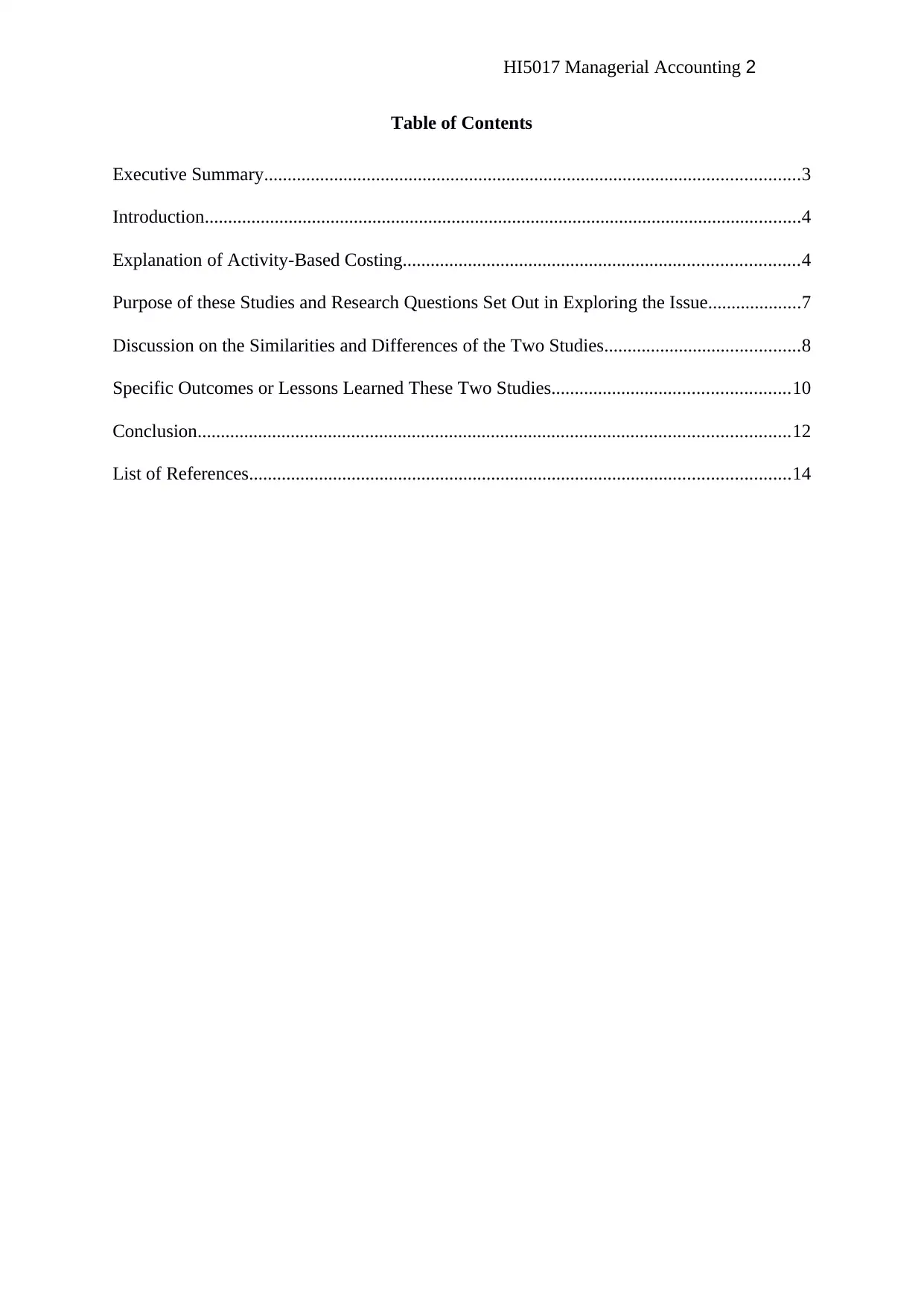
HI5017 Managerial Accounting 2
Table of Contents
Executive Summary...................................................................................................................3
Introduction................................................................................................................................4
Explanation of Activity-Based Costing.....................................................................................4
Purpose of these Studies and Research Questions Set Out in Exploring the Issue....................7
Discussion on the Similarities and Differences of the Two Studies..........................................8
Specific Outcomes or Lessons Learned These Two Studies...................................................10
Conclusion...............................................................................................................................12
List of References....................................................................................................................14
Table of Contents
Executive Summary...................................................................................................................3
Introduction................................................................................................................................4
Explanation of Activity-Based Costing.....................................................................................4
Purpose of these Studies and Research Questions Set Out in Exploring the Issue....................7
Discussion on the Similarities and Differences of the Two Studies..........................................8
Specific Outcomes or Lessons Learned These Two Studies...................................................10
Conclusion...............................................................................................................................12
List of References....................................................................................................................14
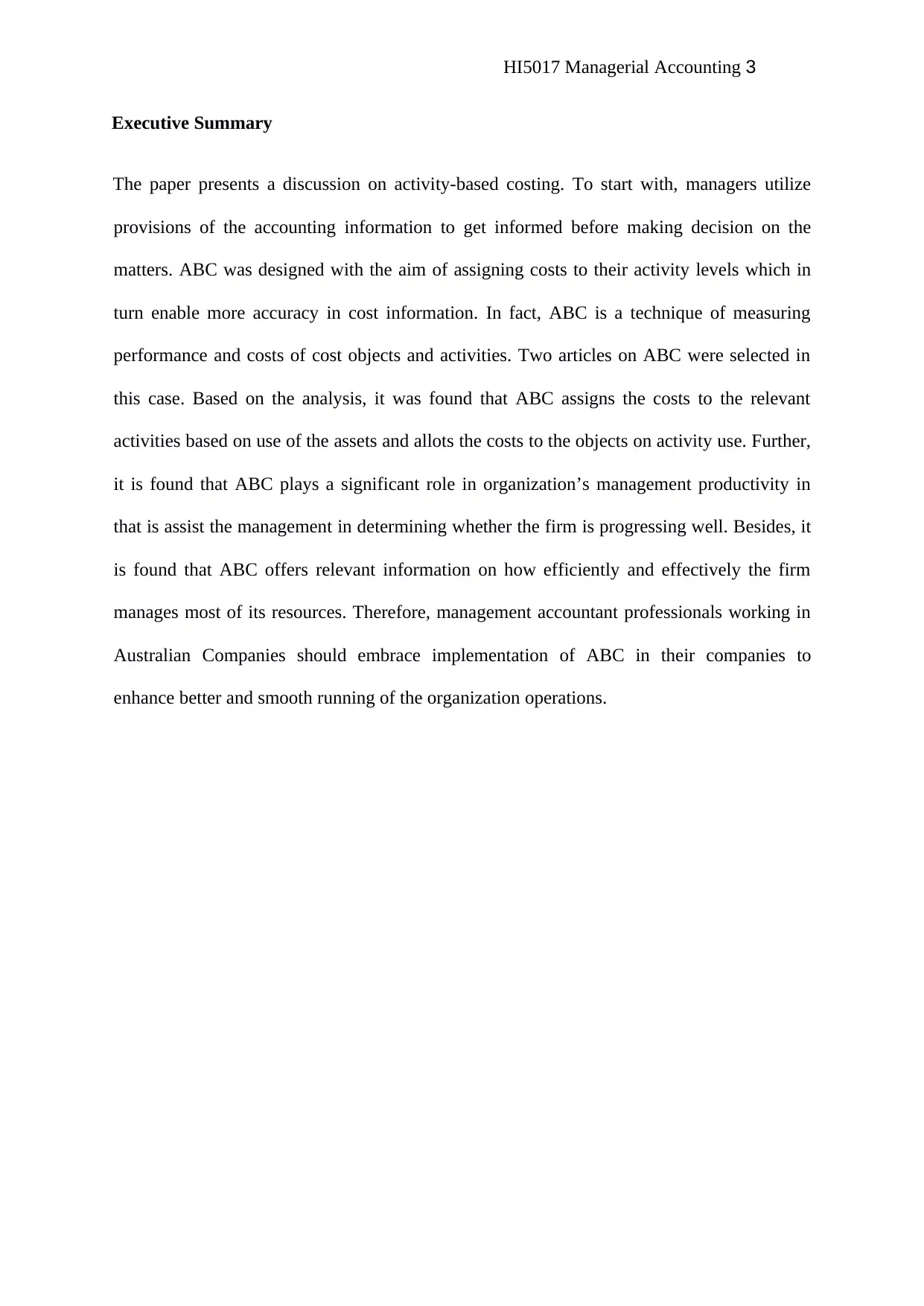
HI5017 Managerial Accounting 3
Executive Summary
The paper presents a discussion on activity-based costing. To start with, managers utilize
provisions of the accounting information to get informed before making decision on the
matters. ABC was designed with the aim of assigning costs to their activity levels which in
turn enable more accuracy in cost information. In fact, ABC is a technique of measuring
performance and costs of cost objects and activities. Two articles on ABC were selected in
this case. Based on the analysis, it was found that ABC assigns the costs to the relevant
activities based on use of the assets and allots the costs to the objects on activity use. Further,
it is found that ABC plays a significant role in organization’s management productivity in
that is assist the management in determining whether the firm is progressing well. Besides, it
is found that ABC offers relevant information on how efficiently and effectively the firm
manages most of its resources. Therefore, management accountant professionals working in
Australian Companies should embrace implementation of ABC in their companies to
enhance better and smooth running of the organization operations.
Executive Summary
The paper presents a discussion on activity-based costing. To start with, managers utilize
provisions of the accounting information to get informed before making decision on the
matters. ABC was designed with the aim of assigning costs to their activity levels which in
turn enable more accuracy in cost information. In fact, ABC is a technique of measuring
performance and costs of cost objects and activities. Two articles on ABC were selected in
this case. Based on the analysis, it was found that ABC assigns the costs to the relevant
activities based on use of the assets and allots the costs to the objects on activity use. Further,
it is found that ABC plays a significant role in organization’s management productivity in
that is assist the management in determining whether the firm is progressing well. Besides, it
is found that ABC offers relevant information on how efficiently and effectively the firm
manages most of its resources. Therefore, management accountant professionals working in
Australian Companies should embrace implementation of ABC in their companies to
enhance better and smooth running of the organization operations.
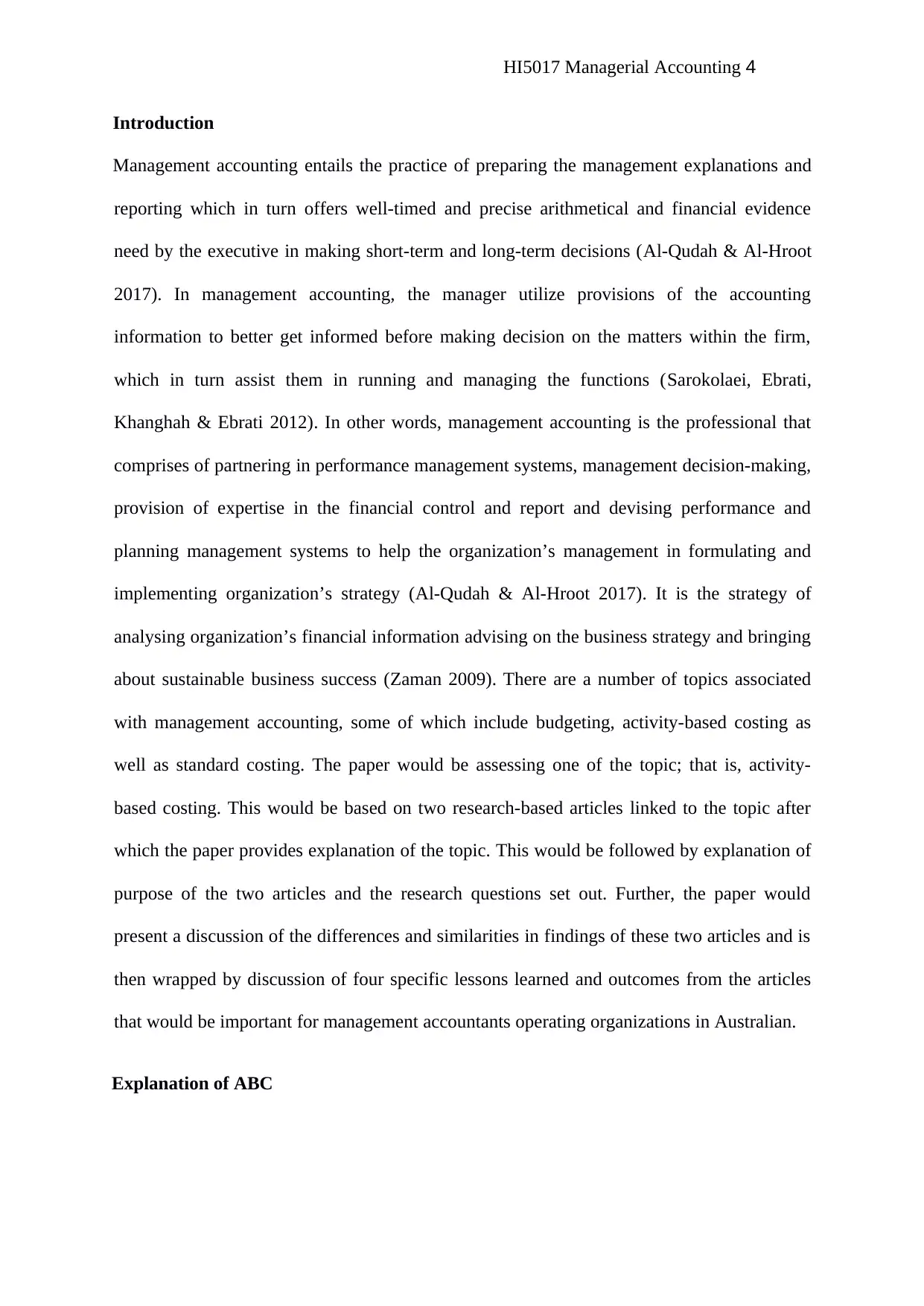
HI5017 Managerial Accounting 4
Introduction
Management accounting entails the practice of preparing the management explanations and
reporting which in turn offers well-timed and precise arithmetical and financial evidence
need by the executive in making short-term and long-term decisions (Al-Qudah & Al-Hroot
2017). In management accounting, the manager utilize provisions of the accounting
information to better get informed before making decision on the matters within the firm,
which in turn assist them in running and managing the functions (Sarokolaei, Ebrati,
Khanghah & Ebrati 2012). In other words, management accounting is the professional that
comprises of partnering in performance management systems, management decision-making,
provision of expertise in the financial control and report and devising performance and
planning management systems to help the organization’s management in formulating and
implementing organization’s strategy (Al-Qudah & Al-Hroot 2017). It is the strategy of
analysing organization’s financial information advising on the business strategy and bringing
about sustainable business success (Zaman 2009). There are a number of topics associated
with management accounting, some of which include budgeting, activity-based costing as
well as standard costing. The paper would be assessing one of the topic; that is, activity-
based costing. This would be based on two research-based articles linked to the topic after
which the paper provides explanation of the topic. This would be followed by explanation of
purpose of the two articles and the research questions set out. Further, the paper would
present a discussion of the differences and similarities in findings of these two articles and is
then wrapped by discussion of four specific lessons learned and outcomes from the articles
that would be important for management accountants operating organizations in Australian.
Explanation of ABC
Introduction
Management accounting entails the practice of preparing the management explanations and
reporting which in turn offers well-timed and precise arithmetical and financial evidence
need by the executive in making short-term and long-term decisions (Al-Qudah & Al-Hroot
2017). In management accounting, the manager utilize provisions of the accounting
information to better get informed before making decision on the matters within the firm,
which in turn assist them in running and managing the functions (Sarokolaei, Ebrati,
Khanghah & Ebrati 2012). In other words, management accounting is the professional that
comprises of partnering in performance management systems, management decision-making,
provision of expertise in the financial control and report and devising performance and
planning management systems to help the organization’s management in formulating and
implementing organization’s strategy (Al-Qudah & Al-Hroot 2017). It is the strategy of
analysing organization’s financial information advising on the business strategy and bringing
about sustainable business success (Zaman 2009). There are a number of topics associated
with management accounting, some of which include budgeting, activity-based costing as
well as standard costing. The paper would be assessing one of the topic; that is, activity-
based costing. This would be based on two research-based articles linked to the topic after
which the paper provides explanation of the topic. This would be followed by explanation of
purpose of the two articles and the research questions set out. Further, the paper would
present a discussion of the differences and similarities in findings of these two articles and is
then wrapped by discussion of four specific lessons learned and outcomes from the articles
that would be important for management accountants operating organizations in Australian.
Explanation of ABC
Paraphrase This Document
Need a fresh take? Get an instant paraphrase of this document with our AI Paraphraser
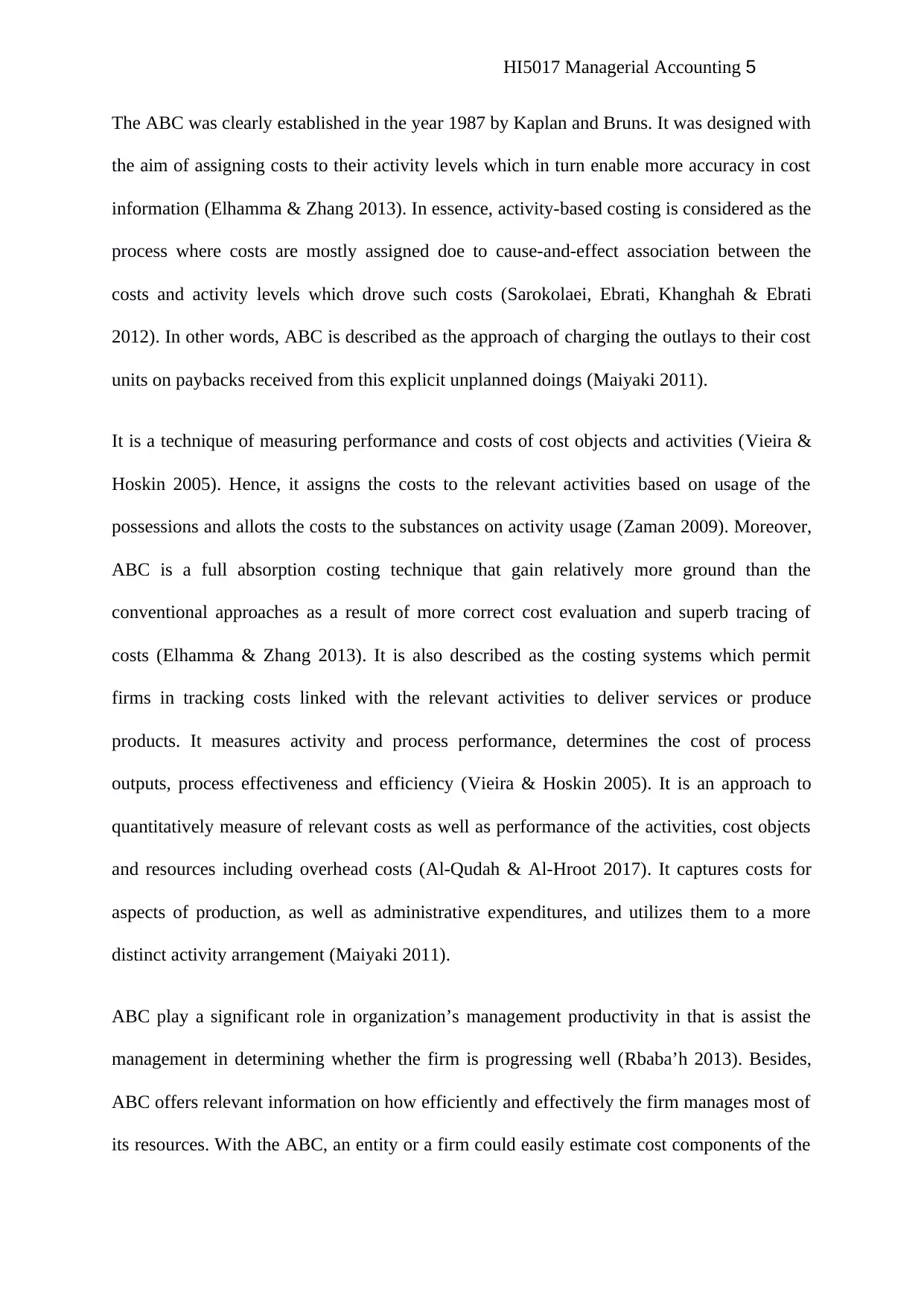
HI5017 Managerial Accounting 5
The ABC was clearly established in the year 1987 by Kaplan and Bruns. It was designed with
the aim of assigning costs to their activity levels which in turn enable more accuracy in cost
information (Elhamma & Zhang 2013). In essence, activity-based costing is considered as the
process where costs are mostly assigned doe to cause-and-effect association between the
costs and activity levels which drove such costs (Sarokolaei, Ebrati, Khanghah & Ebrati
2012). In other words, ABC is described as the approach of charging the outlays to their cost
units on paybacks received from this explicit unplanned doings (Maiyaki 2011).
It is a technique of measuring performance and costs of cost objects and activities (Vieira &
Hoskin 2005). Hence, it assigns the costs to the relevant activities based on usage of the
possessions and allots the costs to the substances on activity usage (Zaman 2009). Moreover,
ABC is a full absorption costing technique that gain relatively more ground than the
conventional approaches as a result of more correct cost evaluation and superb tracing of
costs (Elhamma & Zhang 2013). It is also described as the costing systems which permit
firms in tracking costs linked with the relevant activities to deliver services or produce
products. It measures activity and process performance, determines the cost of process
outputs, process effectiveness and efficiency (Vieira & Hoskin 2005). It is an approach to
quantitatively measure of relevant costs as well as performance of the activities, cost objects
and resources including overhead costs (Al-Qudah & Al-Hroot 2017). It captures costs for
aspects of production, as well as administrative expenditures, and utilizes them to a more
distinct activity arrangement (Maiyaki 2011).
ABC play a significant role in organization’s management productivity in that is assist the
management in determining whether the firm is progressing well (Rbaba’h 2013). Besides,
ABC offers relevant information on how efficiently and effectively the firm manages most of
its resources. With the ABC, an entity or a firm could easily estimate cost components of the
The ABC was clearly established in the year 1987 by Kaplan and Bruns. It was designed with
the aim of assigning costs to their activity levels which in turn enable more accuracy in cost
information (Elhamma & Zhang 2013). In essence, activity-based costing is considered as the
process where costs are mostly assigned doe to cause-and-effect association between the
costs and activity levels which drove such costs (Sarokolaei, Ebrati, Khanghah & Ebrati
2012). In other words, ABC is described as the approach of charging the outlays to their cost
units on paybacks received from this explicit unplanned doings (Maiyaki 2011).
It is a technique of measuring performance and costs of cost objects and activities (Vieira &
Hoskin 2005). Hence, it assigns the costs to the relevant activities based on usage of the
possessions and allots the costs to the substances on activity usage (Zaman 2009). Moreover,
ABC is a full absorption costing technique that gain relatively more ground than the
conventional approaches as a result of more correct cost evaluation and superb tracing of
costs (Elhamma & Zhang 2013). It is also described as the costing systems which permit
firms in tracking costs linked with the relevant activities to deliver services or produce
products. It measures activity and process performance, determines the cost of process
outputs, process effectiveness and efficiency (Vieira & Hoskin 2005). It is an approach to
quantitatively measure of relevant costs as well as performance of the activities, cost objects
and resources including overhead costs (Al-Qudah & Al-Hroot 2017). It captures costs for
aspects of production, as well as administrative expenditures, and utilizes them to a more
distinct activity arrangement (Maiyaki 2011).
ABC play a significant role in organization’s management productivity in that is assist the
management in determining whether the firm is progressing well (Rbaba’h 2013). Besides,
ABC offers relevant information on how efficiently and effectively the firm manages most of
its resources. With the ABC, an entity or a firm could easily estimate cost components of the
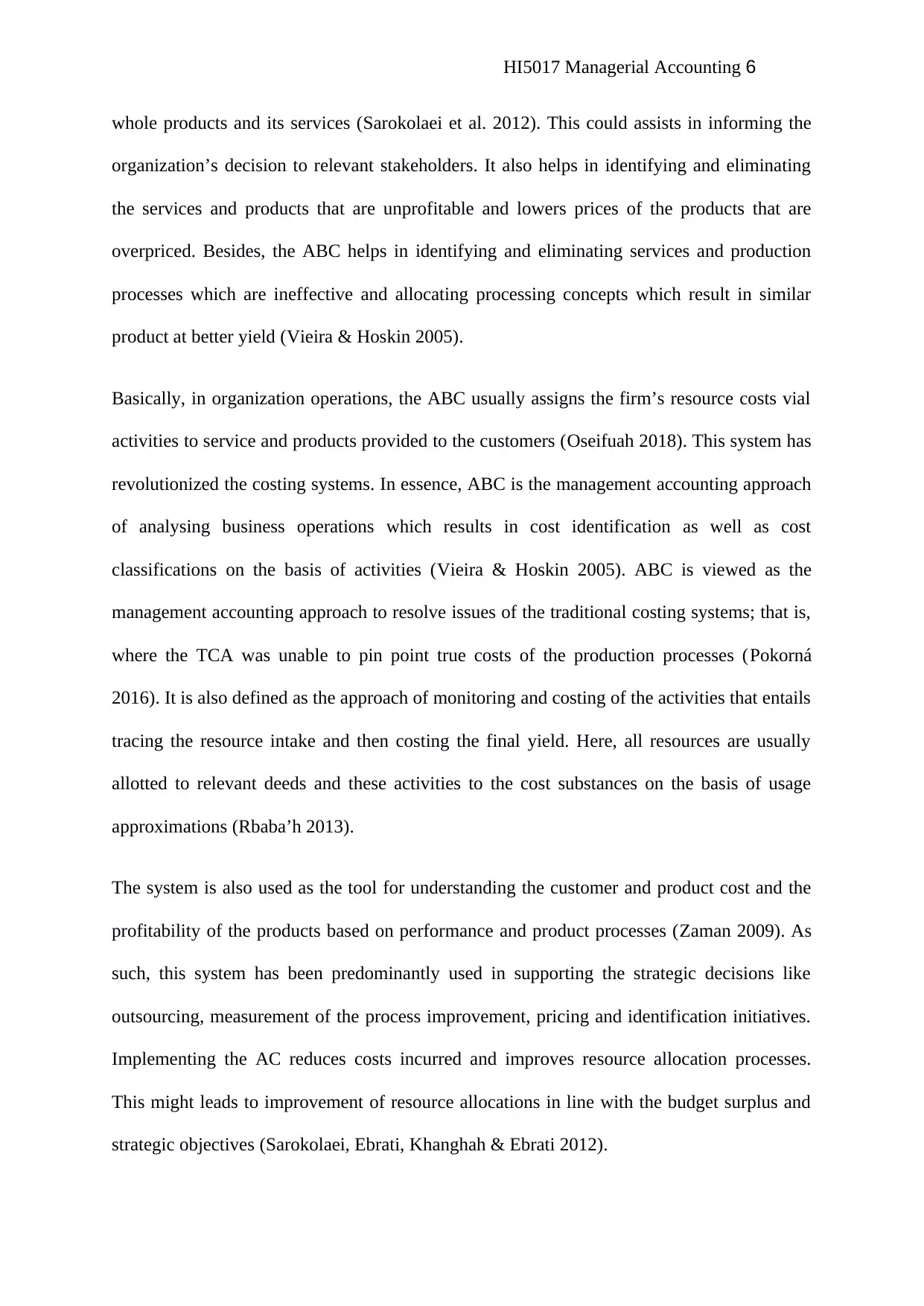
HI5017 Managerial Accounting 6
whole products and its services (Sarokolaei et al. 2012). This could assists in informing the
organization’s decision to relevant stakeholders. It also helps in identifying and eliminating
the services and products that are unprofitable and lowers prices of the products that are
overpriced. Besides, the ABC helps in identifying and eliminating services and production
processes which are ineffective and allocating processing concepts which result in similar
product at better yield (Vieira & Hoskin 2005).
Basically, in organization operations, the ABC usually assigns the firm’s resource costs vial
activities to service and products provided to the customers (Oseifuah 2018). This system has
revolutionized the costing systems. In essence, ABC is the management accounting approach
of analysing business operations which results in cost identification as well as cost
classifications on the basis of activities (Vieira & Hoskin 2005). ABC is viewed as the
management accounting approach to resolve issues of the traditional costing systems; that is,
where the TCA was unable to pin point true costs of the production processes (Pokorná
2016). It is also defined as the approach of monitoring and costing of the activities that entails
tracing the resource intake and then costing the final yield. Here, all resources are usually
allotted to relevant deeds and these activities to the cost substances on the basis of usage
approximations (Rbaba’h 2013).
The system is also used as the tool for understanding the customer and product cost and the
profitability of the products based on performance and product processes (Zaman 2009). As
such, this system has been predominantly used in supporting the strategic decisions like
outsourcing, measurement of the process improvement, pricing and identification initiatives.
Implementing the AC reduces costs incurred and improves resource allocation processes.
This might leads to improvement of resource allocations in line with the budget surplus and
strategic objectives (Sarokolaei, Ebrati, Khanghah & Ebrati 2012).
whole products and its services (Sarokolaei et al. 2012). This could assists in informing the
organization’s decision to relevant stakeholders. It also helps in identifying and eliminating
the services and products that are unprofitable and lowers prices of the products that are
overpriced. Besides, the ABC helps in identifying and eliminating services and production
processes which are ineffective and allocating processing concepts which result in similar
product at better yield (Vieira & Hoskin 2005).
Basically, in organization operations, the ABC usually assigns the firm’s resource costs vial
activities to service and products provided to the customers (Oseifuah 2018). This system has
revolutionized the costing systems. In essence, ABC is the management accounting approach
of analysing business operations which results in cost identification as well as cost
classifications on the basis of activities (Vieira & Hoskin 2005). ABC is viewed as the
management accounting approach to resolve issues of the traditional costing systems; that is,
where the TCA was unable to pin point true costs of the production processes (Pokorná
2016). It is also defined as the approach of monitoring and costing of the activities that entails
tracing the resource intake and then costing the final yield. Here, all resources are usually
allotted to relevant deeds and these activities to the cost substances on the basis of usage
approximations (Rbaba’h 2013).
The system is also used as the tool for understanding the customer and product cost and the
profitability of the products based on performance and product processes (Zaman 2009). As
such, this system has been predominantly used in supporting the strategic decisions like
outsourcing, measurement of the process improvement, pricing and identification initiatives.
Implementing the AC reduces costs incurred and improves resource allocation processes.
This might leads to improvement of resource allocations in line with the budget surplus and
strategic objectives (Sarokolaei, Ebrati, Khanghah & Ebrati 2012).
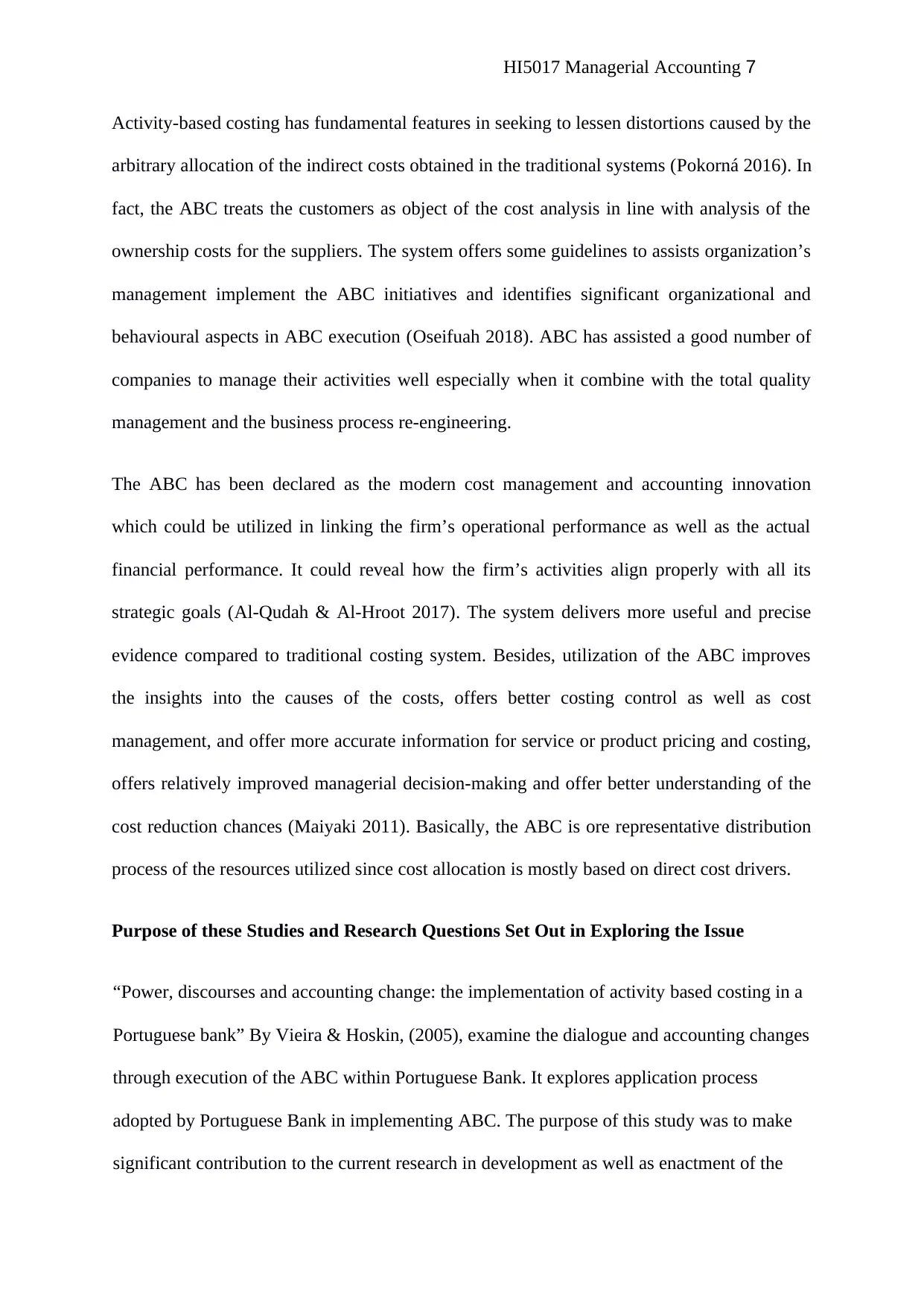
HI5017 Managerial Accounting 7
Activity-based costing has fundamental features in seeking to lessen distortions caused by the
arbitrary allocation of the indirect costs obtained in the traditional systems (Pokorná 2016). In
fact, the ABC treats the customers as object of the cost analysis in line with analysis of the
ownership costs for the suppliers. The system offers some guidelines to assists organization’s
management implement the ABC initiatives and identifies significant organizational and
behavioural aspects in ABC execution (Oseifuah 2018). ABC has assisted a good number of
companies to manage their activities well especially when it combine with the total quality
management and the business process re-engineering.
The ABC has been declared as the modern cost management and accounting innovation
which could be utilized in linking the firm’s operational performance as well as the actual
financial performance. It could reveal how the firm’s activities align properly with all its
strategic goals (Al-Qudah & Al-Hroot 2017). The system delivers more useful and precise
evidence compared to traditional costing system. Besides, utilization of the ABC improves
the insights into the causes of the costs, offers better costing control as well as cost
management, and offer more accurate information for service or product pricing and costing,
offers relatively improved managerial decision-making and offer better understanding of the
cost reduction chances (Maiyaki 2011). Basically, the ABC is ore representative distribution
process of the resources utilized since cost allocation is mostly based on direct cost drivers.
Purpose of these Studies and Research Questions Set Out in Exploring the Issue
“Power, discourses and accounting change: the implementation of activity based costing in a
Portuguese bank” By Vieira & Hoskin, (2005), examine the dialogue and accounting changes
through execution of the ABC within Portuguese Bank. It explores application process
adopted by Portuguese Bank in implementing ABC. The purpose of this study was to make
significant contribution to the current research in development as well as enactment of the
Activity-based costing has fundamental features in seeking to lessen distortions caused by the
arbitrary allocation of the indirect costs obtained in the traditional systems (Pokorná 2016). In
fact, the ABC treats the customers as object of the cost analysis in line with analysis of the
ownership costs for the suppliers. The system offers some guidelines to assists organization’s
management implement the ABC initiatives and identifies significant organizational and
behavioural aspects in ABC execution (Oseifuah 2018). ABC has assisted a good number of
companies to manage their activities well especially when it combine with the total quality
management and the business process re-engineering.
The ABC has been declared as the modern cost management and accounting innovation
which could be utilized in linking the firm’s operational performance as well as the actual
financial performance. It could reveal how the firm’s activities align properly with all its
strategic goals (Al-Qudah & Al-Hroot 2017). The system delivers more useful and precise
evidence compared to traditional costing system. Besides, utilization of the ABC improves
the insights into the causes of the costs, offers better costing control as well as cost
management, and offer more accurate information for service or product pricing and costing,
offers relatively improved managerial decision-making and offer better understanding of the
cost reduction chances (Maiyaki 2011). Basically, the ABC is ore representative distribution
process of the resources utilized since cost allocation is mostly based on direct cost drivers.
Purpose of these Studies and Research Questions Set Out in Exploring the Issue
“Power, discourses and accounting change: the implementation of activity based costing in a
Portuguese bank” By Vieira & Hoskin, (2005), examine the dialogue and accounting changes
through execution of the ABC within Portuguese Bank. It explores application process
adopted by Portuguese Bank in implementing ABC. The purpose of this study was to make
significant contribution to the current research in development as well as enactment of the
Secure Best Marks with AI Grader
Need help grading? Try our AI Grader for instant feedback on your assignments.
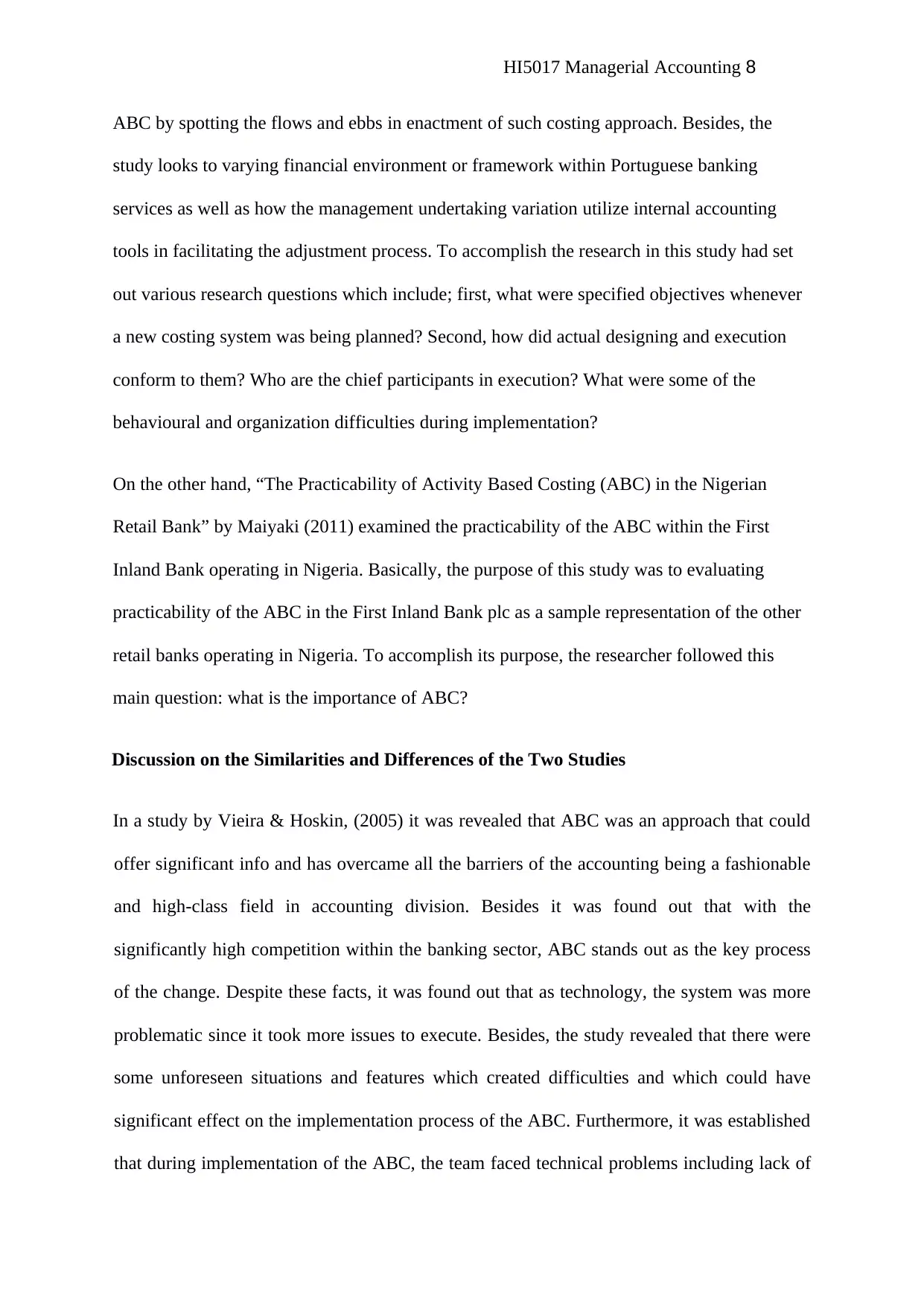
HI5017 Managerial Accounting 8
ABC by spotting the flows and ebbs in enactment of such costing approach. Besides, the
study looks to varying financial environment or framework within Portuguese banking
services as well as how the management undertaking variation utilize internal accounting
tools in facilitating the adjustment process. To accomplish the research in this study had set
out various research questions which include; first, what were specified objectives whenever
a new costing system was being planned? Second, how did actual designing and execution
conform to them? Who are the chief participants in execution? What were some of the
behavioural and organization difficulties during implementation?
On the other hand, “The Practicability of Activity Based Costing (ABC) in the Nigerian
Retail Bank” by Maiyaki (2011) examined the practicability of the ABC within the First
Inland Bank operating in Nigeria. Basically, the purpose of this study was to evaluating
practicability of the ABC in the First Inland Bank plc as a sample representation of the other
retail banks operating in Nigeria. To accomplish its purpose, the researcher followed this
main question: what is the importance of ABC?
Discussion on the Similarities and Differences of the Two Studies
In a study by Vieira & Hoskin, (2005) it was revealed that ABC was an approach that could
offer significant info and has overcame all the barriers of the accounting being a fashionable
and high-class field in accounting division. Besides it was found out that with the
significantly high competition within the banking sector, ABC stands out as the key process
of the change. Despite these facts, it was found out that as technology, the system was more
problematic since it took more issues to execute. Besides, the study revealed that there were
some unforeseen situations and features which created difficulties and which could have
significant effect on the implementation process of the ABC. Furthermore, it was established
that during implementation of the ABC, the team faced technical problems including lack of
ABC by spotting the flows and ebbs in enactment of such costing approach. Besides, the
study looks to varying financial environment or framework within Portuguese banking
services as well as how the management undertaking variation utilize internal accounting
tools in facilitating the adjustment process. To accomplish the research in this study had set
out various research questions which include; first, what were specified objectives whenever
a new costing system was being planned? Second, how did actual designing and execution
conform to them? Who are the chief participants in execution? What were some of the
behavioural and organization difficulties during implementation?
On the other hand, “The Practicability of Activity Based Costing (ABC) in the Nigerian
Retail Bank” by Maiyaki (2011) examined the practicability of the ABC within the First
Inland Bank operating in Nigeria. Basically, the purpose of this study was to evaluating
practicability of the ABC in the First Inland Bank plc as a sample representation of the other
retail banks operating in Nigeria. To accomplish its purpose, the researcher followed this
main question: what is the importance of ABC?
Discussion on the Similarities and Differences of the Two Studies
In a study by Vieira & Hoskin, (2005) it was revealed that ABC was an approach that could
offer significant info and has overcame all the barriers of the accounting being a fashionable
and high-class field in accounting division. Besides it was found out that with the
significantly high competition within the banking sector, ABC stands out as the key process
of the change. Despite these facts, it was found out that as technology, the system was more
problematic since it took more issues to execute. Besides, the study revealed that there were
some unforeseen situations and features which created difficulties and which could have
significant effect on the implementation process of the ABC. Furthermore, it was established
that during implementation of the ABC, the team faced technical problems including lack of
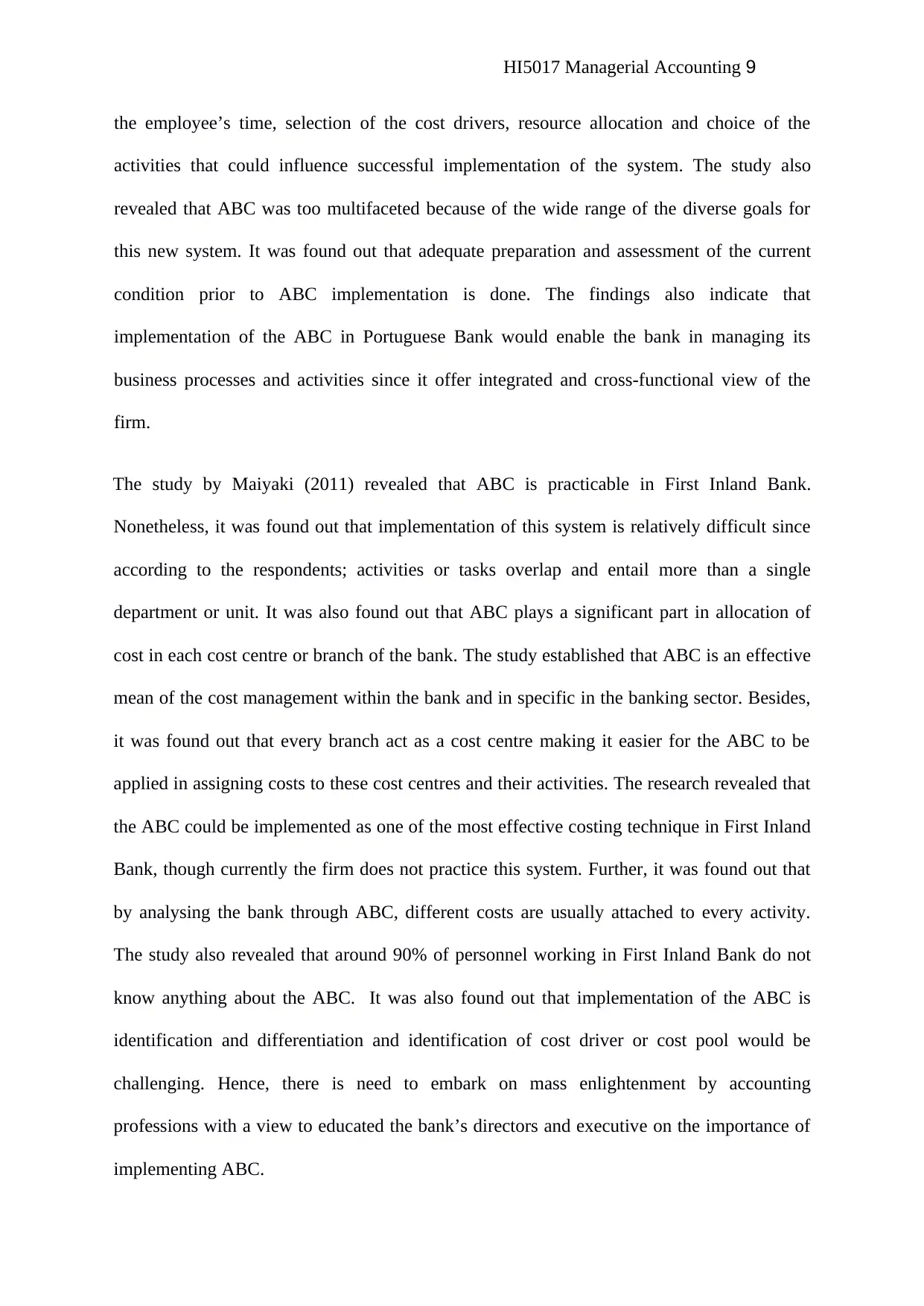
HI5017 Managerial Accounting 9
the employee’s time, selection of the cost drivers, resource allocation and choice of the
activities that could influence successful implementation of the system. The study also
revealed that ABC was too multifaceted because of the wide range of the diverse goals for
this new system. It was found out that adequate preparation and assessment of the current
condition prior to ABC implementation is done. The findings also indicate that
implementation of the ABC in Portuguese Bank would enable the bank in managing its
business processes and activities since it offer integrated and cross-functional view of the
firm.
The study by Maiyaki (2011) revealed that ABC is practicable in First Inland Bank.
Nonetheless, it was found out that implementation of this system is relatively difficult since
according to the respondents; activities or tasks overlap and entail more than a single
department or unit. It was also found out that ABC plays a significant part in allocation of
cost in each cost centre or branch of the bank. The study established that ABC is an effective
mean of the cost management within the bank and in specific in the banking sector. Besides,
it was found out that every branch act as a cost centre making it easier for the ABC to be
applied in assigning costs to these cost centres and their activities. The research revealed that
the ABC could be implemented as one of the most effective costing technique in First Inland
Bank, though currently the firm does not practice this system. Further, it was found out that
by analysing the bank through ABC, different costs are usually attached to every activity.
The study also revealed that around 90% of personnel working in First Inland Bank do not
know anything about the ABC. It was also found out that implementation of the ABC is
identification and differentiation and identification of cost driver or cost pool would be
challenging. Hence, there is need to embark on mass enlightenment by accounting
professions with a view to educated the bank’s directors and executive on the importance of
implementing ABC.
the employee’s time, selection of the cost drivers, resource allocation and choice of the
activities that could influence successful implementation of the system. The study also
revealed that ABC was too multifaceted because of the wide range of the diverse goals for
this new system. It was found out that adequate preparation and assessment of the current
condition prior to ABC implementation is done. The findings also indicate that
implementation of the ABC in Portuguese Bank would enable the bank in managing its
business processes and activities since it offer integrated and cross-functional view of the
firm.
The study by Maiyaki (2011) revealed that ABC is practicable in First Inland Bank.
Nonetheless, it was found out that implementation of this system is relatively difficult since
according to the respondents; activities or tasks overlap and entail more than a single
department or unit. It was also found out that ABC plays a significant part in allocation of
cost in each cost centre or branch of the bank. The study established that ABC is an effective
mean of the cost management within the bank and in specific in the banking sector. Besides,
it was found out that every branch act as a cost centre making it easier for the ABC to be
applied in assigning costs to these cost centres and their activities. The research revealed that
the ABC could be implemented as one of the most effective costing technique in First Inland
Bank, though currently the firm does not practice this system. Further, it was found out that
by analysing the bank through ABC, different costs are usually attached to every activity.
The study also revealed that around 90% of personnel working in First Inland Bank do not
know anything about the ABC. It was also found out that implementation of the ABC is
identification and differentiation and identification of cost driver or cost pool would be
challenging. Hence, there is need to embark on mass enlightenment by accounting
professions with a view to educated the bank’s directors and executive on the importance of
implementing ABC.
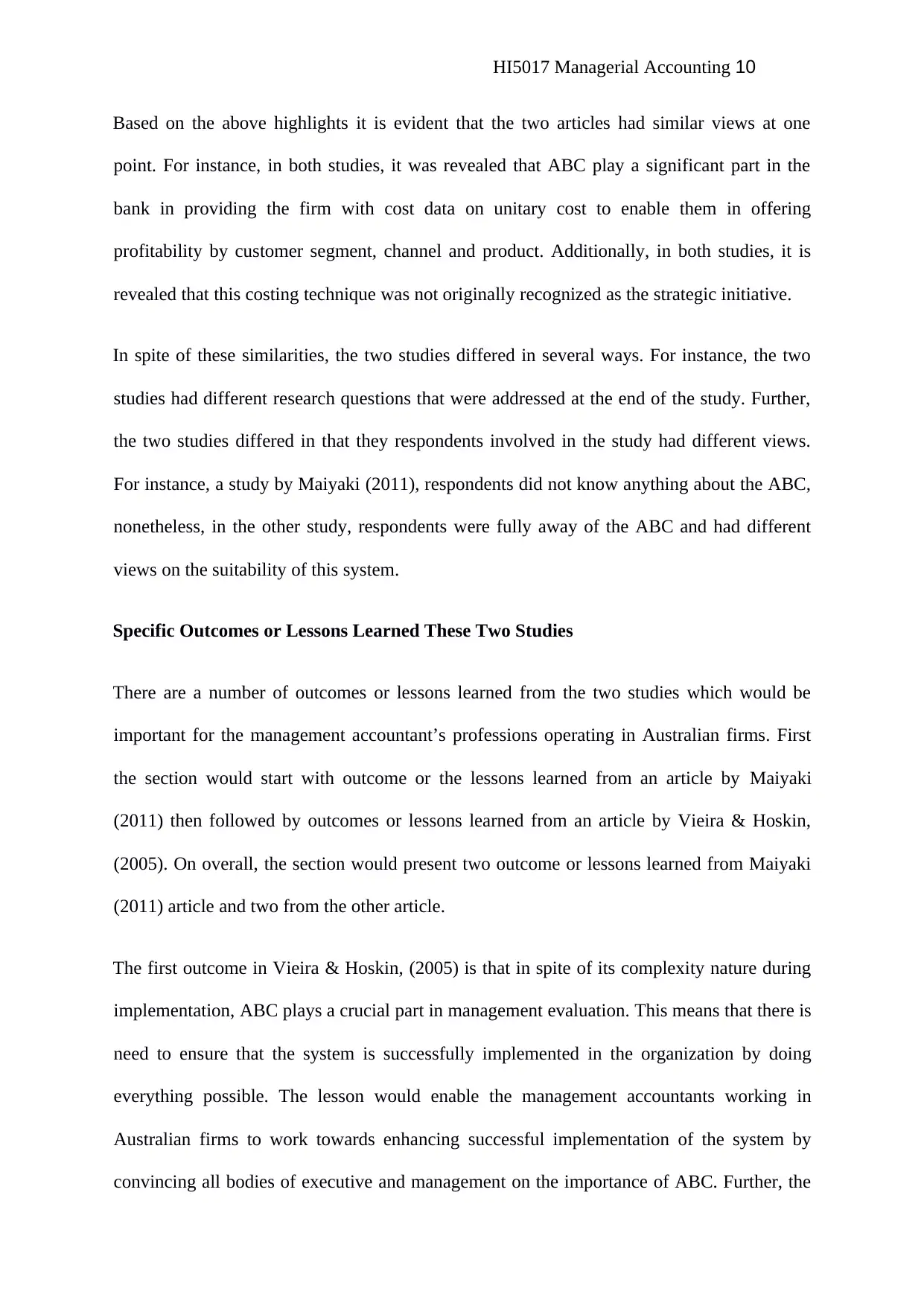
HI5017 Managerial Accounting 10
Based on the above highlights it is evident that the two articles had similar views at one
point. For instance, in both studies, it was revealed that ABC play a significant part in the
bank in providing the firm with cost data on unitary cost to enable them in offering
profitability by customer segment, channel and product. Additionally, in both studies, it is
revealed that this costing technique was not originally recognized as the strategic initiative.
In spite of these similarities, the two studies differed in several ways. For instance, the two
studies had different research questions that were addressed at the end of the study. Further,
the two studies differed in that they respondents involved in the study had different views.
For instance, a study by Maiyaki (2011), respondents did not know anything about the ABC,
nonetheless, in the other study, respondents were fully away of the ABC and had different
views on the suitability of this system.
Specific Outcomes or Lessons Learned These Two Studies
There are a number of outcomes or lessons learned from the two studies which would be
important for the management accountant’s professions operating in Australian firms. First
the section would start with outcome or the lessons learned from an article by Maiyaki
(2011) then followed by outcomes or lessons learned from an article by Vieira & Hoskin,
(2005). On overall, the section would present two outcome or lessons learned from Maiyaki
(2011) article and two from the other article.
The first outcome in Vieira & Hoskin, (2005) is that in spite of its complexity nature during
implementation, ABC plays a crucial part in management evaluation. This means that there is
need to ensure that the system is successfully implemented in the organization by doing
everything possible. The lesson would enable the management accountants working in
Australian firms to work towards enhancing successful implementation of the system by
convincing all bodies of executive and management on the importance of ABC. Further, the
Based on the above highlights it is evident that the two articles had similar views at one
point. For instance, in both studies, it was revealed that ABC play a significant part in the
bank in providing the firm with cost data on unitary cost to enable them in offering
profitability by customer segment, channel and product. Additionally, in both studies, it is
revealed that this costing technique was not originally recognized as the strategic initiative.
In spite of these similarities, the two studies differed in several ways. For instance, the two
studies had different research questions that were addressed at the end of the study. Further,
the two studies differed in that they respondents involved in the study had different views.
For instance, a study by Maiyaki (2011), respondents did not know anything about the ABC,
nonetheless, in the other study, respondents were fully away of the ABC and had different
views on the suitability of this system.
Specific Outcomes or Lessons Learned These Two Studies
There are a number of outcomes or lessons learned from the two studies which would be
important for the management accountant’s professions operating in Australian firms. First
the section would start with outcome or the lessons learned from an article by Maiyaki
(2011) then followed by outcomes or lessons learned from an article by Vieira & Hoskin,
(2005). On overall, the section would present two outcome or lessons learned from Maiyaki
(2011) article and two from the other article.
The first outcome in Vieira & Hoskin, (2005) is that in spite of its complexity nature during
implementation, ABC plays a crucial part in management evaluation. This means that there is
need to ensure that the system is successfully implemented in the organization by doing
everything possible. The lesson would enable the management accountants working in
Australian firms to work towards enhancing successful implementation of the system by
convincing all bodies of executive and management on the importance of ABC. Further, the
Paraphrase This Document
Need a fresh take? Get an instant paraphrase of this document with our AI Paraphraser
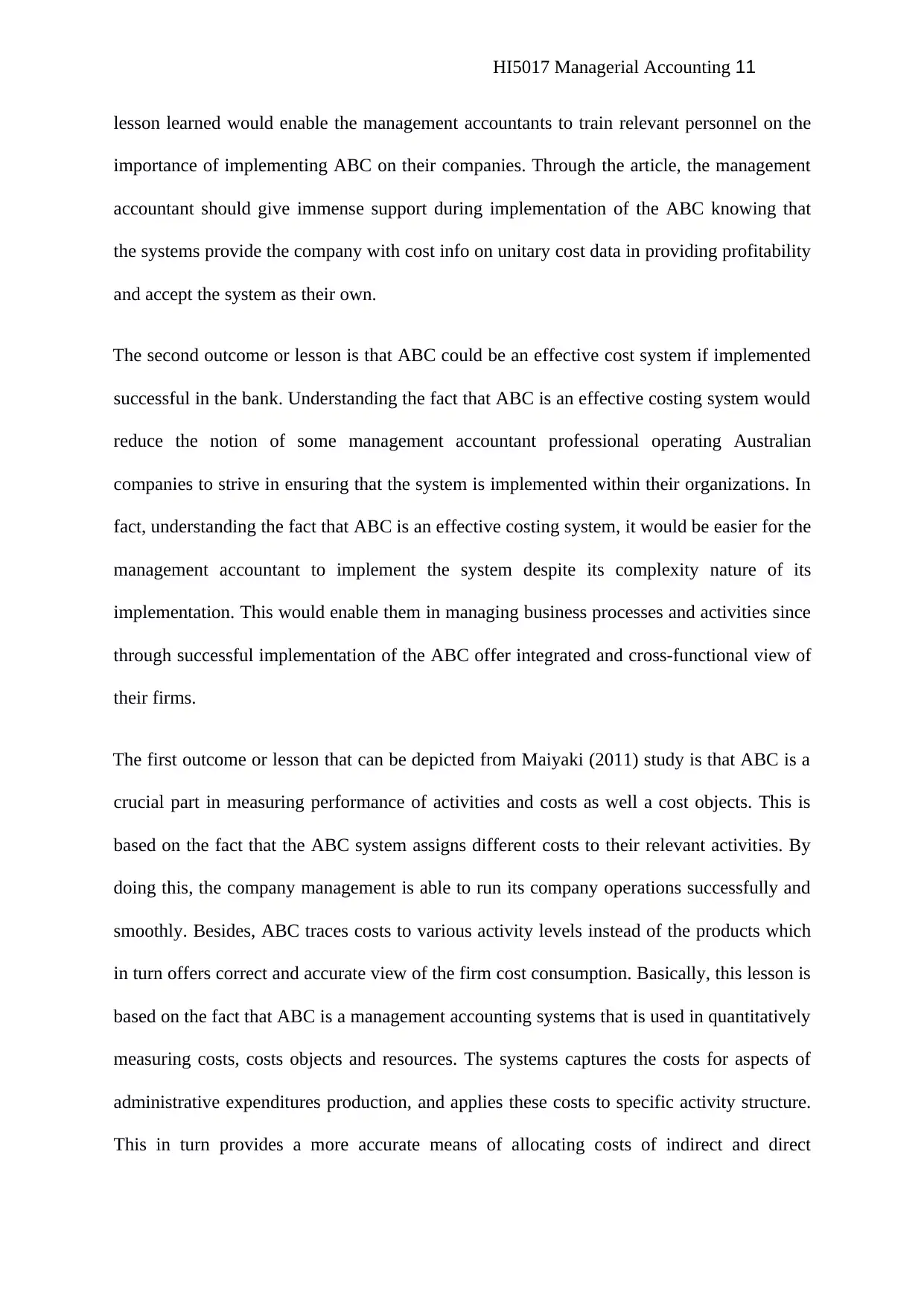
HI5017 Managerial Accounting 11
lesson learned would enable the management accountants to train relevant personnel on the
importance of implementing ABC on their companies. Through the article, the management
accountant should give immense support during implementation of the ABC knowing that
the systems provide the company with cost info on unitary cost data in providing profitability
and accept the system as their own.
The second outcome or lesson is that ABC could be an effective cost system if implemented
successful in the bank. Understanding the fact that ABC is an effective costing system would
reduce the notion of some management accountant professional operating Australian
companies to strive in ensuring that the system is implemented within their organizations. In
fact, understanding the fact that ABC is an effective costing system, it would be easier for the
management accountant to implement the system despite its complexity nature of its
implementation. This would enable them in managing business processes and activities since
through successful implementation of the ABC offer integrated and cross-functional view of
their firms.
The first outcome or lesson that can be depicted from Maiyaki (2011) study is that ABC is a
crucial part in measuring performance of activities and costs as well a cost objects. This is
based on the fact that the ABC system assigns different costs to their relevant activities. By
doing this, the company management is able to run its company operations successfully and
smoothly. Besides, ABC traces costs to various activity levels instead of the products which
in turn offers correct and accurate view of the firm cost consumption. Basically, this lesson is
based on the fact that ABC is a management accounting systems that is used in quantitatively
measuring costs, costs objects and resources. The systems captures the costs for aspects of
administrative expenditures production, and applies these costs to specific activity structure.
This in turn provides a more accurate means of allocating costs of indirect and direct
lesson learned would enable the management accountants to train relevant personnel on the
importance of implementing ABC on their companies. Through the article, the management
accountant should give immense support during implementation of the ABC knowing that
the systems provide the company with cost info on unitary cost data in providing profitability
and accept the system as their own.
The second outcome or lesson is that ABC could be an effective cost system if implemented
successful in the bank. Understanding the fact that ABC is an effective costing system would
reduce the notion of some management accountant professional operating Australian
companies to strive in ensuring that the system is implemented within their organizations. In
fact, understanding the fact that ABC is an effective costing system, it would be easier for the
management accountant to implement the system despite its complexity nature of its
implementation. This would enable them in managing business processes and activities since
through successful implementation of the ABC offer integrated and cross-functional view of
their firms.
The first outcome or lesson that can be depicted from Maiyaki (2011) study is that ABC is a
crucial part in measuring performance of activities and costs as well a cost objects. This is
based on the fact that the ABC system assigns different costs to their relevant activities. By
doing this, the company management is able to run its company operations successfully and
smoothly. Besides, ABC traces costs to various activity levels instead of the products which
in turn offers correct and accurate view of the firm cost consumption. Basically, this lesson is
based on the fact that ABC is a management accounting systems that is used in quantitatively
measuring costs, costs objects and resources. The systems captures the costs for aspects of
administrative expenditures production, and applies these costs to specific activity structure.
This in turn provides a more accurate means of allocating costs of indirect and direct
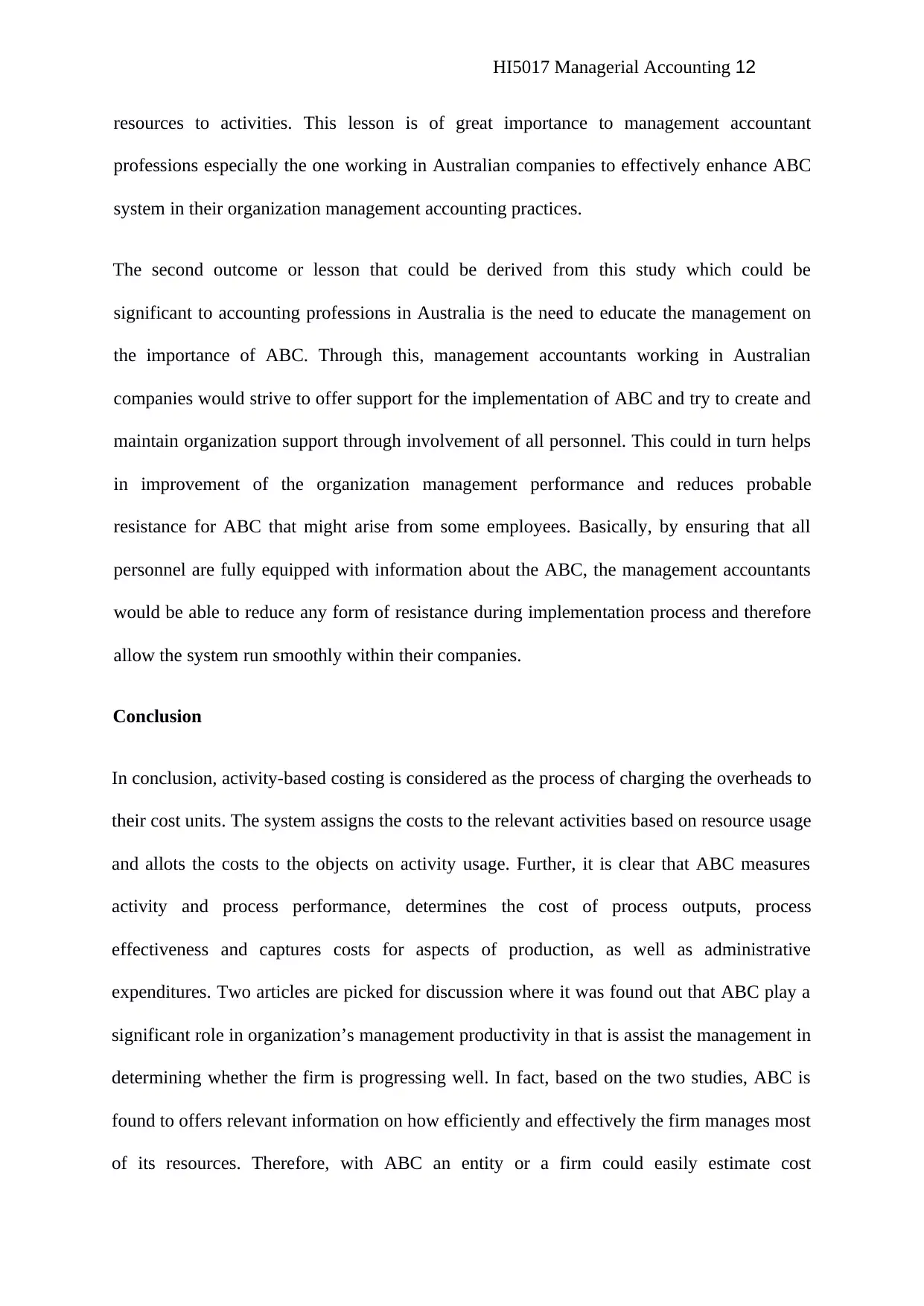
HI5017 Managerial Accounting 12
resources to activities. This lesson is of great importance to management accountant
professions especially the one working in Australian companies to effectively enhance ABC
system in their organization management accounting practices.
The second outcome or lesson that could be derived from this study which could be
significant to accounting professions in Australia is the need to educate the management on
the importance of ABC. Through this, management accountants working in Australian
companies would strive to offer support for the implementation of ABC and try to create and
maintain organization support through involvement of all personnel. This could in turn helps
in improvement of the organization management performance and reduces probable
resistance for ABC that might arise from some employees. Basically, by ensuring that all
personnel are fully equipped with information about the ABC, the management accountants
would be able to reduce any form of resistance during implementation process and therefore
allow the system run smoothly within their companies.
Conclusion
In conclusion, activity-based costing is considered as the process of charging the overheads to
their cost units. The system assigns the costs to the relevant activities based on resource usage
and allots the costs to the objects on activity usage. Further, it is clear that ABC measures
activity and process performance, determines the cost of process outputs, process
effectiveness and captures costs for aspects of production, as well as administrative
expenditures. Two articles are picked for discussion where it was found out that ABC play a
significant role in organization’s management productivity in that is assist the management in
determining whether the firm is progressing well. In fact, based on the two studies, ABC is
found to offers relevant information on how efficiently and effectively the firm manages most
of its resources. Therefore, with ABC an entity or a firm could easily estimate cost
resources to activities. This lesson is of great importance to management accountant
professions especially the one working in Australian companies to effectively enhance ABC
system in their organization management accounting practices.
The second outcome or lesson that could be derived from this study which could be
significant to accounting professions in Australia is the need to educate the management on
the importance of ABC. Through this, management accountants working in Australian
companies would strive to offer support for the implementation of ABC and try to create and
maintain organization support through involvement of all personnel. This could in turn helps
in improvement of the organization management performance and reduces probable
resistance for ABC that might arise from some employees. Basically, by ensuring that all
personnel are fully equipped with information about the ABC, the management accountants
would be able to reduce any form of resistance during implementation process and therefore
allow the system run smoothly within their companies.
Conclusion
In conclusion, activity-based costing is considered as the process of charging the overheads to
their cost units. The system assigns the costs to the relevant activities based on resource usage
and allots the costs to the objects on activity usage. Further, it is clear that ABC measures
activity and process performance, determines the cost of process outputs, process
effectiveness and captures costs for aspects of production, as well as administrative
expenditures. Two articles are picked for discussion where it was found out that ABC play a
significant role in organization’s management productivity in that is assist the management in
determining whether the firm is progressing well. In fact, based on the two studies, ABC is
found to offers relevant information on how efficiently and effectively the firm manages most
of its resources. Therefore, with ABC an entity or a firm could easily estimate cost
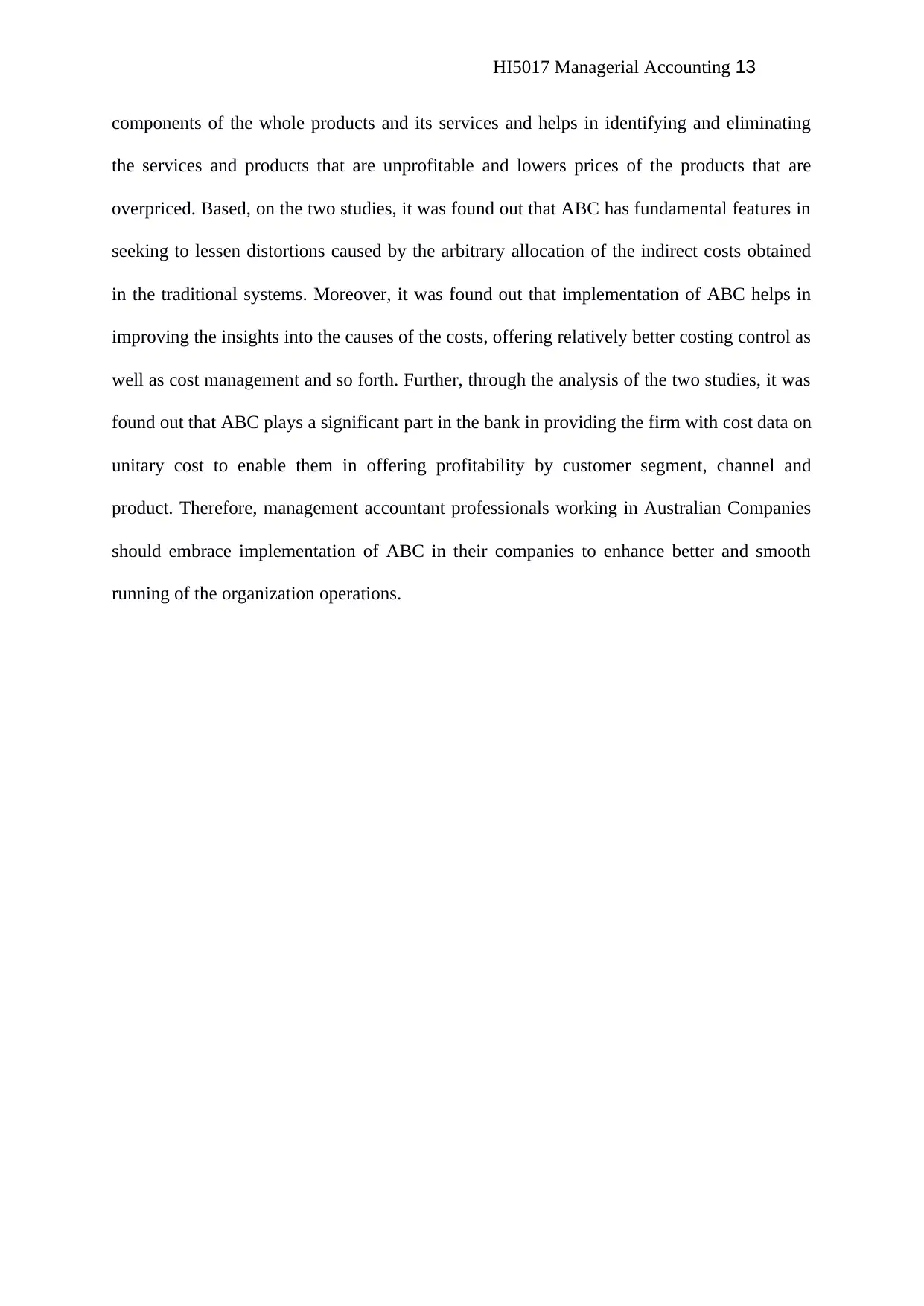
HI5017 Managerial Accounting 13
components of the whole products and its services and helps in identifying and eliminating
the services and products that are unprofitable and lowers prices of the products that are
overpriced. Based, on the two studies, it was found out that ABC has fundamental features in
seeking to lessen distortions caused by the arbitrary allocation of the indirect costs obtained
in the traditional systems. Moreover, it was found out that implementation of ABC helps in
improving the insights into the causes of the costs, offering relatively better costing control as
well as cost management and so forth. Further, through the analysis of the two studies, it was
found out that ABC plays a significant part in the bank in providing the firm with cost data on
unitary cost to enable them in offering profitability by customer segment, channel and
product. Therefore, management accountant professionals working in Australian Companies
should embrace implementation of ABC in their companies to enhance better and smooth
running of the organization operations.
components of the whole products and its services and helps in identifying and eliminating
the services and products that are unprofitable and lowers prices of the products that are
overpriced. Based, on the two studies, it was found out that ABC has fundamental features in
seeking to lessen distortions caused by the arbitrary allocation of the indirect costs obtained
in the traditional systems. Moreover, it was found out that implementation of ABC helps in
improving the insights into the causes of the costs, offering relatively better costing control as
well as cost management and so forth. Further, through the analysis of the two studies, it was
found out that ABC plays a significant part in the bank in providing the firm with cost data on
unitary cost to enable them in offering profitability by customer segment, channel and
product. Therefore, management accountant professionals working in Australian Companies
should embrace implementation of ABC in their companies to enhance better and smooth
running of the organization operations.
Secure Best Marks with AI Grader
Need help grading? Try our AI Grader for instant feedback on your assignments.
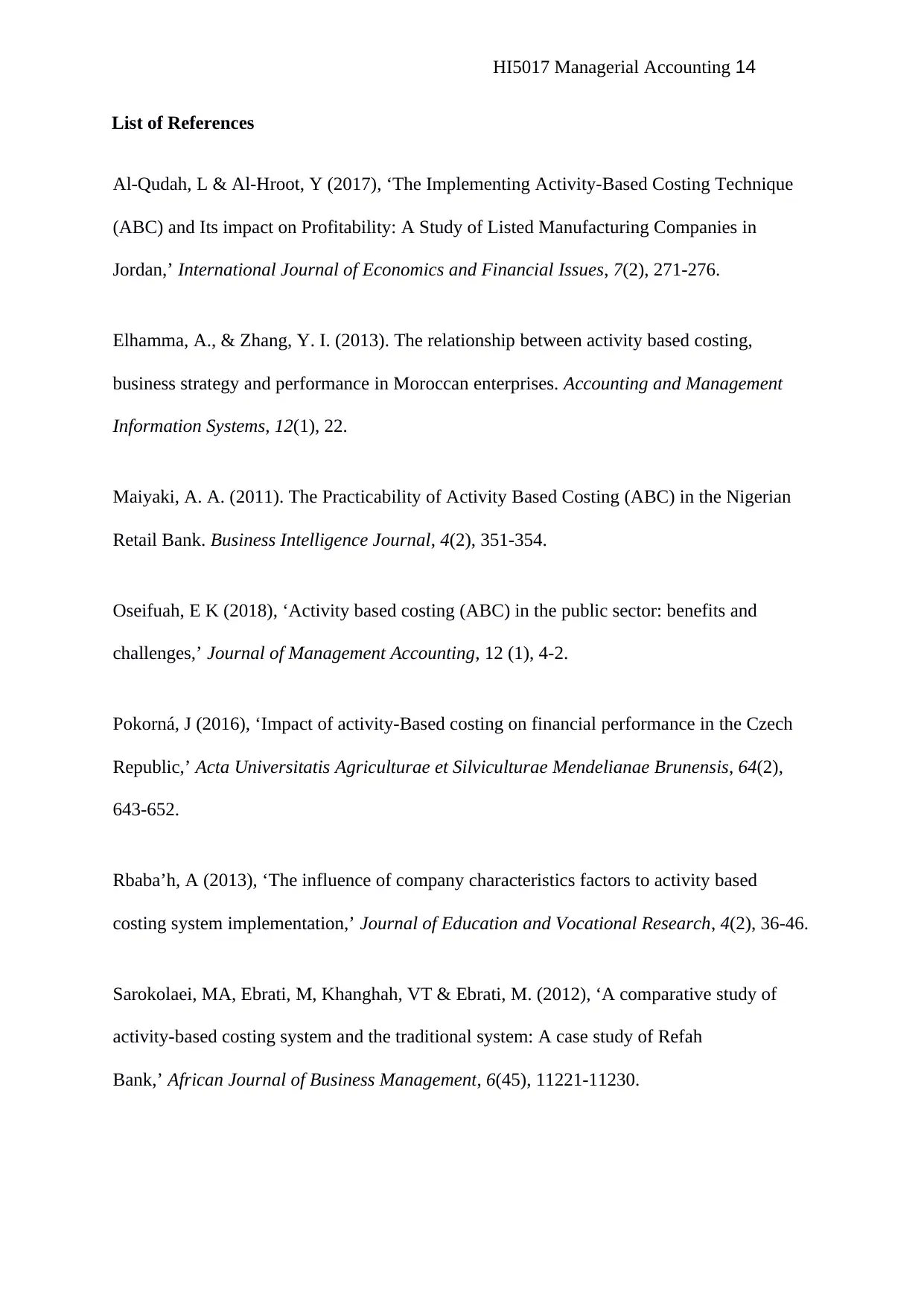
HI5017 Managerial Accounting 14
List of References
Al-Qudah, L & Al-Hroot, Y (2017), ‘The Implementing Activity-Based Costing Technique
(ABC) and Its impact on Profitability: A Study of Listed Manufacturing Companies in
Jordan,’ International Journal of Economics and Financial Issues, 7(2), 271-276.
Elhamma, A., & Zhang, Y. I. (2013). The relationship between activity based costing,
business strategy and performance in Moroccan enterprises. Accounting and Management
Information Systems, 12(1), 22.
Maiyaki, A. A. (2011). The Practicability of Activity Based Costing (ABC) in the Nigerian
Retail Bank. Business Intelligence Journal, 4(2), 351-354.
Oseifuah, E K (2018), ‘Activity based costing (ABC) in the public sector: benefits and
challenges,’ Journal of Management Accounting, 12 (1), 4-2.
Pokorná, J (2016), ‘Impact of activity-Based costing on financial performance in the Czech
Republic,’ Acta Universitatis Agriculturae et Silviculturae Mendelianae Brunensis, 64(2),
643-652.
Rbaba’h, A (2013), ‘The influence of company characteristics factors to activity based
costing system implementation,’ Journal of Education and Vocational Research, 4(2), 36-46.
Sarokolaei, MA, Ebrati, M, Khanghah, VT & Ebrati, M. (2012), ‘A comparative study of
activity-based costing system and the traditional system: A case study of Refah
Bank,’ African Journal of Business Management, 6(45), 11221-11230.
List of References
Al-Qudah, L & Al-Hroot, Y (2017), ‘The Implementing Activity-Based Costing Technique
(ABC) and Its impact on Profitability: A Study of Listed Manufacturing Companies in
Jordan,’ International Journal of Economics and Financial Issues, 7(2), 271-276.
Elhamma, A., & Zhang, Y. I. (2013). The relationship between activity based costing,
business strategy and performance in Moroccan enterprises. Accounting and Management
Information Systems, 12(1), 22.
Maiyaki, A. A. (2011). The Practicability of Activity Based Costing (ABC) in the Nigerian
Retail Bank. Business Intelligence Journal, 4(2), 351-354.
Oseifuah, E K (2018), ‘Activity based costing (ABC) in the public sector: benefits and
challenges,’ Journal of Management Accounting, 12 (1), 4-2.
Pokorná, J (2016), ‘Impact of activity-Based costing on financial performance in the Czech
Republic,’ Acta Universitatis Agriculturae et Silviculturae Mendelianae Brunensis, 64(2),
643-652.
Rbaba’h, A (2013), ‘The influence of company characteristics factors to activity based
costing system implementation,’ Journal of Education and Vocational Research, 4(2), 36-46.
Sarokolaei, MA, Ebrati, M, Khanghah, VT & Ebrati, M. (2012), ‘A comparative study of
activity-based costing system and the traditional system: A case study of Refah
Bank,’ African Journal of Business Management, 6(45), 11221-11230.

HI5017 Managerial Accounting 15
VieiraVieira, R., & Hoskin, K. (2005). Power, discourses and accounting change: the
implementation of activity based costing in a Portuguese bank. Journal of Applied
Management Accounting Research. 1 (1) 220-245.
Zaman, M (2009), ‘The Impact of activity based costing on firm performance: The Australian
experience,’ International review of Business research papers, 5(4), 200-208.
VieiraVieira, R., & Hoskin, K. (2005). Power, discourses and accounting change: the
implementation of activity based costing in a Portuguese bank. Journal of Applied
Management Accounting Research. 1 (1) 220-245.
Zaman, M (2009), ‘The Impact of activity based costing on firm performance: The Australian
experience,’ International review of Business research papers, 5(4), 200-208.
1 out of 15
Related Documents
Your All-in-One AI-Powered Toolkit for Academic Success.
+13062052269
info@desklib.com
Available 24*7 on WhatsApp / Email
![[object Object]](/_next/static/media/star-bottom.7253800d.svg)
Unlock your academic potential
© 2024 | Zucol Services PVT LTD | All rights reserved.




